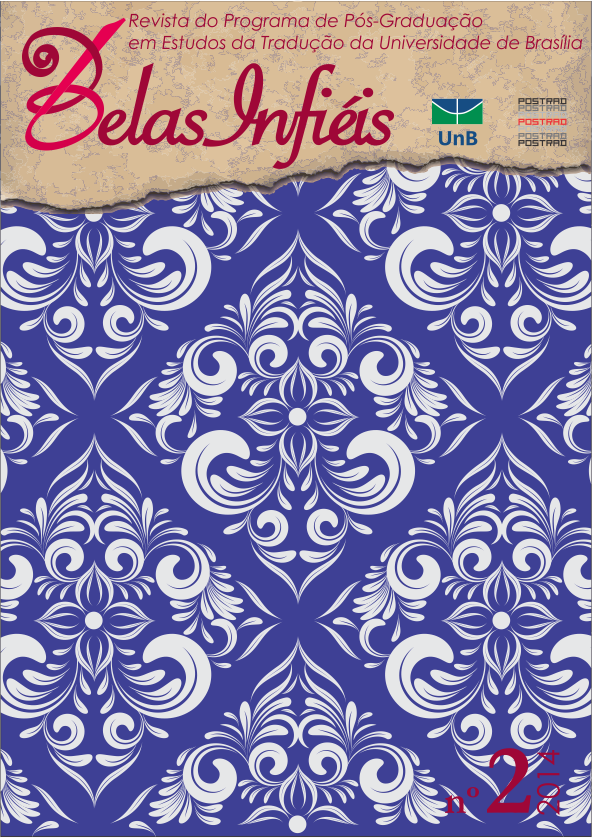ESTRANGEIRIZAÇÃO E DOMESTICAÇÃO NOS QUADRINHOS DE TINTIM
DOI :
https://doi.org/10.26512/belasinfieis.v3.n2.2014.11283Mots-clés :
HQs, paratextos, estrangeirização, domesticação, estudos da traduçãoRésumé
A tradução de histórias em quadrinhos envolve vários aspectos visuais e verbais. Muitas informações sobre o projeto de tradução podem ser veiculadas por algumas escolhas tanto no texto, como no âmbito dos paratextos descritos por Genette. O presente artigo tem como objeto de análise as traduções do livro Les aventures de Tintin: le lotus bleu, de Hergé para o inglês e o português, levando em consideração os aspectos de estrangeirização e domesticação de Venuti e Berman.
Références
BERMAN, A tradução e a letra ou o albergue do longínquo. 2ª edição, Florianópolis, PGET/UFSC Copiart, 2012.
BRAGA, Ana Cláudia Viera. Norma linguística e oralidade fingida na tradução de Persépolis. Brasília, 2014.Dissertação de mestrado.(Mestrado em Estudos da Tradução) Universidade de Brasília, Brasília, 2014. Disponível em:<http://repositorio.unb.br/handle/10482/15091> Acesso online em 23 de dezembro de 2014.
ECO, Umberto. Apocalípticos e Integrados. São Paulo: Perspectiva (Debates, 19), 1979.
EISNER, Will. Quadrinhos e arte sequencial:princípios e práticas do lendário cartunista.Trad: BOIDE, Alexandre; BORGES, Luis Carlos. 2ª tiragem. São Paulo: WMF Martins, 2012.
FERREIRA DE FREITAS, Luana; ARAÚJO DA SILVA, Camila.Autoria, paratexto e recepção das traduções de Venuti.Eutomia, edição 10, dez.2012, pp. 239-246.
GENETTE, Gérard; MACLEAN, Marta. Introduction to paratext. New Literary History, Vol. 22, No. 2, Probings: Art, Criticism, Genre. (Spring, 1991), pp.261-272.
_______. Paratextos editoriais. Trad: FALEIROS, Álvaro. Cotia, São Paulo: Ateliê Editorial, 2009.
HERGÉ. Le lotus bleu. Belgium: Casterman, 1975.
_______. O lótus azul. Trad: BRANDÃO, Eduardo. São Paulo: Quadrinhos na Cia, 2005.
_______. The blue lotus. New York: Little, Brown and Company, 2011.
MCCLOUD, Scott. Desvendando os quadrinhos. São Paulo, M.Books, 2004.
OUSTINOFF, Michaël. Trad: MARCONILDO, Marcos. Tradução:História, teorias e métodos. São Paulo, Parábola Editorial, 2011.
RAMOS, Paulo. Faces do humor ”“uma aproximação entre piadas e tiras. São Paulo: Zarabatana Books. 2011.
_______. A leitura dos quadrinhos. 2ª edição. São Paulo: Editora Contexto, 2012.
_______. Estratégias de referenciação emtextos multimodais: uma aplicação em tiras cômicas. Linguagem em (Dis)curso, Tubarão, SC, v. 12, n. 3, p. 743-763, set./dez. 2012.
ROSA, Gisele Marion. A tradução quadrinhística:sinais de conflito entre imagem e texto. In: Tradterm, 16, São Paulo,2010, pp. 411-434.
SANTAELLA, Lúcia. Semiótica aplicada. São Paulo: Pioneira Thomson Learning, 2002.
SERRA E DEUS, Lílian Paula. A língua é minha pátria:hibridação e expressão de identidades nas literaturas africanas de língua portuguesa. Belo Horizonte, 2012. Dissertação de mestrado. Pontifícia Universidade Católica de Minas Gerais, Programa de Pós-Graduação em Letras. Disponível em:<http://www.biblioteca.pucminas.br/teses/Letras_DeusLPS_1.pdf>Acesso online em 23 de novembro de 2014.
VENUTI, Lawrence. O escândalo da tradução. In: Tradterm 3, São Paulo,1996. pp. 111-122.
_______. The scandals of translation: toward an ethics of difference. New York: Routledge, 1998
Téléchargements
Publié
Numéro
Rubrique
Licence
Copyright Statement
Given the public access to this journal, the texts are free to use but requires the recognition of the original authorship and initial publication in this journal to be properly stated.
The journal allows the use of works published for non-commercial purposes, including the right to submit the work to publicly accessible databases. Published contributions are the sole and exclusive responsibility of the author(s).
- When submitting papers to be evaluated by the Belas Infiéis journal, the author(s):
- Declare that the contents of the contributions are original and of their original creation, being entirely responsible for their content if there is an objection by third parties.
- Claim to be aware that they should not commit academic plagiarism.
- Declare that the manuscript has not been published, completely or partially, in Portuguese or another language. If it is a translation it should be submitted to the Translated Articles section.
- Declare that the manuscript is not being evaluated by other journals.
- Declare that the manuscript was not submitted to another journal simultaneously.
- Commit(s) to inform the journal of any kind of error or inaccuracy in their contribution (published, in evaluation or in editing) and to collaborate with the editors to make due corrections of the article (when in evaluation or editing) or erratum/retraction (after publication).
- Declare that there is no conflict of interest regarding the published work.
- Authorize its release if it is accepted for publication without any kind of monetary compensation.
- Agree to assign non-exclusive rights to publication to the magazine, remaining free to make their contribution available in other media as long as the publication of the first version in Belas Infiéis magazine is mentioned. They also authorize Belas Infiéis to assign their texts for reproduction in content indexers, virtual libraries and similar platforms.
- Maintain copyright and grant the journal the right of first publication, the work being licensed under theCreative Commons Attribution License.
- Is/Are allowed and encouraged to publish and distribute their work online after the editorial process, which may increase the impact and citation of the published work.
- Authorize the editorial team to make textual adjustments and to adapt the article to the publication rules, when necessary.



















